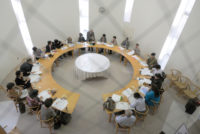
Japan P.E.N. Club Statement – The Exhibition “After freedom of expression?” in Aichi Triennale 2019 should be continued
- 2018.01.05
- 過去の記事
Press release The Japan P.E.N. Club Statement
Producers are free to create and receivers are free to appreciate. If there is no space for communication between creation and appreciation, whether one agrees or disagrees, the significance of art will be lost and the spirit of freedom, which is the driving force of society, will shrink.
Takashi Kawamura, Mayor of Nagoya City, requested an immediate suspension of the exhibitions of “The Monument of Peace”” and others in “After freedom of expression?” in Aichi Triennale 2019 and Chief Cabinet Secretary Yoshihide Suga and others issued comments suggesting a suspension of the subsidy for the exhibitions.
Such statements by key government officials are nothing short of political pressure and lead to “censorship” prohibited by Article 21, Paragraph 2 of the Japanese Constitution. Moreover, we cannot help but say that he does not understand the significance of art, which has made people human since the birth of mankind and contributed to the expansion of society.
What the administration should do now is to secure opportunities for communication between creators and viewers through their works and to foster them as a public place. we must be more vigilant about the shortsighted view and the public nature that creates social dynamism from diverse values.
August 3nd,2019
Shinobu Yoshioka
President
The Japan P.E.N.Club
(Background:Aichi Triennale 2019 has been opened from 1st of August in Japan and one of the program, the exhibition “After freedom of expression?” (exhibiting a series of art and literary works removed from public spaces in Japan, including Peace Haiku rejected by local government to publish in the city paper), draws much attention and it is focused specially at the statue of a little girl, called “the Monument of Peace”.
Mr. Daisuke Tsuda, Director of Arts of Aichi Triennale 2019 held the emergent press conference and condemned all sort of censorship by the public authorities and reported the secretariat of Aichi Triennale 2919 received hundreds of telephone calls including harassment against the staff and the pre-notices of the terrorism against the exhibition.)
The Exhibition “After freedom of expression?” (from Aichi Triennale 2019 web site https://aichitriennale.jp/en/artwork/A23.html)
This may seem like a little exhibition inside an exhibition. For one reason or another, due to censorship or self-censorship, most works presented here were not exhibited in the past in Japan. Although the reason for their removal varies, it shows that there is no simple dynamic in regard to “freedom of expression (speech).”
“Freedom of expression” is one of the essential ideas in democracy and basic human rights. However, nowadays freedom of expression which originally means the right to criticize authorities is a subject not only limited to policy-makers. With “freedom of expression” now also regulated to some extent when it may violate the human rights of others.
The exhibition provides you with information on who regulated these works, through which criteria and how, along with the background to each work, such works were censored.
For further inforimation:
Please Contact:
Tsutomu Ide,
Secretary Genearl of the Japan P.E.N. Club
e-mail: tsutomu_ide@japanpen.or.jp
